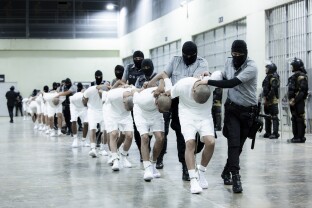U.S. District Judge James Boasberg justified his continued freeze against immigration agents using a wartime measure to hastily ship Venezuelans to a foreign prison, writing a sweeping order on Monday that previews the momentous battle to come between the Trump administration and the courts.
Boasberg refused to drop a temporary restraining order that limits the White House’s latest deportation strategy, citing “a strong public interest in preventing the mistaken deportation of people.”
While the order is merely a stopgap measure for now, it challenged what the judge called President Donald Trump’s “unprecedented use” of the 1798 Alien Enemies Act to fast-track the removal of Venezuelans without due process to a Salvadoran prison known for its alleged mistreatment of inmates.
“As the government itself concedes, the awesome power granted by the act may be brought to bear only on those who are, in fact, ‘alien enemies,’” Boasberg wrote, adding later that people “must be given the opportunity to challenge their classifications as alien enemies.”
As such, he wrote, those apprehended by immigration agents under this national security law “may not be deported until a court has been able to decide” whether they are, in fact, members of the Venezuelan prison gang known as Tren de Aragua. Several migrants who were deported have affirmed in court filings they are not members of the gang. The order follows tension that resulted when Trump officials appeared to ignore the judge’s previous order halting flights that continued south toward El Salvador on March 15.
The judge pointed out that the Alien Enemies Act, which has only been used three times in American history and only during an actual war, clearly states that it kicks in “whenever there is a declared war between the United States and any foreign nation … or any invasion or predatory incursion … against the territory of the United States by any foreign nation or government.”
The TdA gang has historically opposed government forces, including those of Venezuelan autocrat Nicolás Maduro, who falsely claimed that the gang no longer operates there. U.S. spy agencies have determined with “moderate” confidence that the gang is not controlled by Venezuelan government officials, according to The New York Times. That reporting — which cited secret intelligence assessments — is now under investigation by the Department of Justice as a criminal leak, according to a DOJ official who spoke to NOTUS on condition of anonymity.
Boasberg’s ruling came just hours before a D.C. appellate court considers the matter, including the Trump administration’s attempt to have Boasberg removed from the case.
Just an hour after Boasberg’s ruling, the DOJ announced that it plans to extradite three alleged members of the Tren de Aragua gang currently in Indiana, Texas and Washington jails who are wanted by law enforcement in Chile on homicide and kidnapping charges — once again citing the wartime law and labeling them “alien enemies.”
The rapid back-and-forth on this issue marks a steady escalation in the Trump administration’s fights with the courts and journalists, with potential for this case to make it to the Supreme Court for a definitive ruling.
There’s ample room for court clarification on the limits of a severe national security power, with Boasberg explaining on Monday that “the Alien Enemies Act never faced serious questions concerning whether it was a constitutional exercise of Congress’s war powers.”
However, the legal fight underway is relatively narrow. Boasberg noted that the Trump administration may continue to arrest and detain people accused of being Tren de Aragua members — all the more so since the State Department announced the gang was being designated as a foreign terrorist association, a legal framework that puts it alongside pan-Islamist militant groups like Al-Qaeda and Hamas.
Human rights lawyers representing the arrested Venezuelans in the ongoing D.C. case are challenging three aspects of the deportation effort: whether the gang is a formal “invasion” of the United States; a person’s right to contest the accusation; and the removal to a Salvadoran prison where they could face torture.
In his order on Monday, Boasberg leaned most on the second point when ruling that the Trump administration’s efforts must immediately halt to ensure that migrants are afforded due process. However, he explained that courts are empowered to eventually take a closer look at whether the gang’s domestic presence classifies as a Venezuelan government-backed invasion — and he presented grave concerns about the fears of inmate mistreatment.
Boasberg noted that the United Nations’ Convention against Torture “could stand as an independent obstacle” given that Congress in 1998 made it law that “it shall be the policy of the United States not to expel . . . any person to a country in which there are substantial grounds for believing the person would be in danger of being subjected to torture.”
The judge went on to quote various expert declarations in the court docket that document how El Salvador’s Terror Confinement Center is a place where “inmates are rarely allowed to leave their cells, have no regular access to drinking water or adequate food, sleep standing up because of overcrowding, and are held in cells where they do not see sunlight for days.”
Boasberg cited what experts described as the spread of “tuberculosis” and malnutrition, interrogators’ use of a barrel of ice water to freeze and suffocate an inmate during questioning, and the testimonies of prior U.S. deportees “being kicked in the face, neck, abdomen, and testicles, with one requiring ‘an operation for a ruptured pancreas and spleen.’”
Boasberg remained unconvinced of the Trump administration’s “alluding to vague foreign-policy and national-security concerns,” calling them “insufficient.”
—
Jose Pagliery is a reporter at NOTUS.
Sign in
Log into your free account with your email. Don’t have one?
Check your email for a one-time code.
We sent a 4-digit code to . Enter the pin to confirm your account.
New code will be available in 1:00
Let’s try this again.
We encountered an error with the passcode sent to . Please reenter your email.


